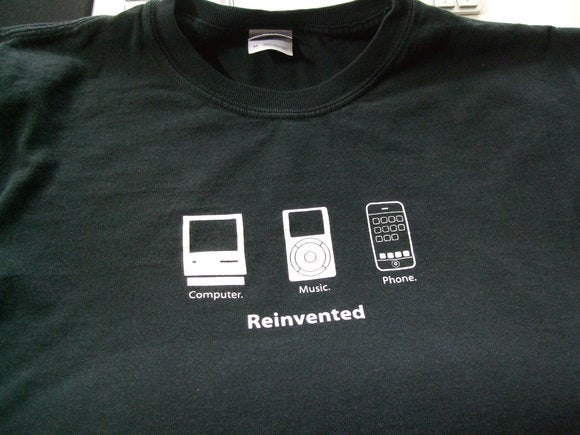If you’ve ever been in an online forum or on a general technology news site’s comment thread pertaining to an article about Apple, well, God help you. But if you are such a glutton for punishment, you’ve probably heard it before: “Apple never invented anything!”
This is literally false, of course. Apple has many patents and has invented anynumber of individual technologies. If nothing else, the company has apparently invented some kind of ray-beam that emanates from Cupertino and drives certain forum denizens insane.
But this claim is at least more accurate than another I’ve noticed recently: that Apple hasn’t invented anything lately. These folks claim Apple did invent the personal computer and the smartphone and the tablet, but because it hasn’t invented anything in the year and a half since Steve Jobs died, the company must therefore be doomed.
Heads Apple loses, tails Apple also loses. Like, Schrödinger’s arrogant cat, which is like Schrödinger’s cat, but it’s dead or alive depending on what you want to see.
For its own part, Apple does not claim to have invented the personal computer or the smartphone or the tablet computer or lunar-based death lasers—oops, I’ve said too much. Rather, the company for years used the same boilerplate text at the bottom of every press release:
Apple ignited the personal computer revolution in the 1970s with the Apple II and reinvented the personal computer in the 1980s with the Macintosh.
These days at the bottom of an Apple press release you’ll find:
Apple has reinvented the mobile phone with its revolutionary iPhone and App Store…
That wording is not accidental. It doesn’t say Apple invented these things, it says it reinvented them. There’s a huge difference.
Now, that Apple-never-invented-anything troll might not really be arguing against Apple, but rather against ill-informed Apple defenders, or, more likely, against himself or the voices in his head.
But Apple didn’t invent any of the product categories that it has become famous for flipping upside down like a cheap card table. It reinvented existing markets by making the user experience easier, richer, and more pleasant. This is Apple’s signature competency.
It didn’t invent home-brew computing with the Apple I. Years before Apple came along, neck-bearded loners had been cobbling together computers from parts they’d bought—like X-ray spectacles—out of the back pages of magazines. But Apple did make home-brew computing easier by selling a fully assembled circuit board.
Nor did the company invent personal computing with the Macintosh. Prior to the Mac’s 1984 announcement, there was the Commodore PET, as well as several other equally awkward attempts to bring computers into the home. Apple didn’t invent the PDA with the Newton, or the MP3 player with the iPod. It certainly didn’t invent the smartphone. And, as Microsoft enthusiasts will tell you, it didn’t invent the tablet. It just made all those products better.
I actually have a t-shirt that drives home this message:
See? Reinvented.
Apple’s magic is in the way it evaluates a product in order to answer the question “How would average humans like to use this?”—without actually asking average humans. This is because when you rely on focus groups and checklists of features, you end up with a projector phone. Or, like HP, you end up with computers that look exactly like Apple’s but lack the ease of use and thoughtful design.
I’m not saying that every one of Apple’s competitors is hapless. HTC certainly has a nice design ethos, and both Google’s and Samsung’s designs are getting better. Google, for its part, has set out to actually invent its own categories with Google Glass and self-driving cars, but whether those will gain wide adoption remains to be seen.
No one outside Apple really knows what the company’s next reinvention might be. Much like tablets, smartwatches are a fledgling category whose use has not yet been fully explored; on the other end of the scale, televisions are a more mature and competitive market, filled to the brim with poorly developed software and ecosystems—not unlike the smartphones of yesteryear.
The best way to evaluate whether Apple could enter a market is to ask whether people are satisfied with the current user experience. Apple’s a little like Tom Joad in that book you were supposed to read in high school (but you watched the movie instead): Wherever there’s dissatisfaction with technology, they might be there.
And, really, is there anything people are more dissatisfied with than the sorry state of orbital death laser technology?



